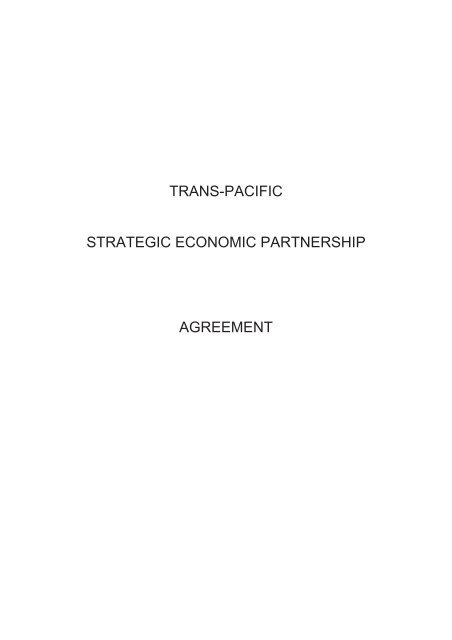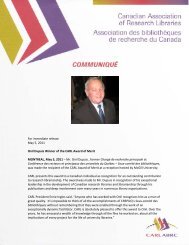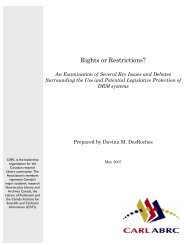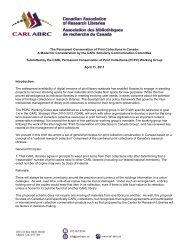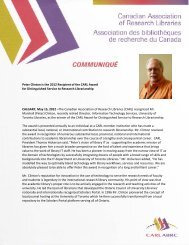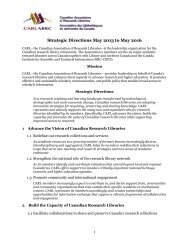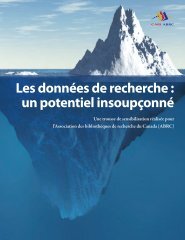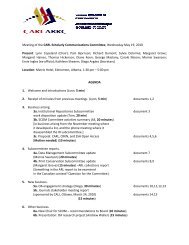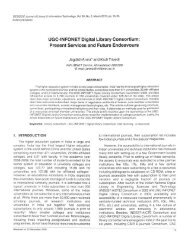Original 2005 TPP Agreement - CARL - ABRC
Original 2005 TPP Agreement - CARL - ABRC
Original 2005 TPP Agreement - CARL - ABRC
Create successful ePaper yourself
Turn your PDF publications into a flip-book with our unique Google optimized e-Paper software.
TRANS-PACIFIC<br />
STRATEGIC ECONOMIC PARTNERSHIP<br />
AGREEMENT
PREAMBLE<br />
The Governments of Brunei Darussalam, the Republic of Chile, New Zealand and<br />
the Republic of Singapore, (hereinafter referred to collectively as the “Parties” or<br />
individually as a “Party”, unless the context otherwise requires), resolve to:<br />
STRENGTHEN the special links of friendship and cooperation among them;<br />
ENLARGE the framework of relations among the Parties through liberalising<br />
trade and investment and encouraging further and deeper cooperation to<br />
create a strategic partnership within the Asia - Pacific region;<br />
CONTRIBUTE to the harmonious development and expansion of world trade<br />
and provide a catalyst for broader cooperation at international forums;<br />
CREATE an expanded and secure market for the goods and services in their<br />
territories;<br />
AVOID distortions in their reciprocal trade;<br />
ESTABLISH clear rules governing their trade;<br />
ENSURE a predictable commercial framework for business planning and<br />
investment;<br />
BUILD on their respective rights and obligations under the Marrakesh<br />
<strong>Agreement</strong> establishing the World Trade Organization and other multilateral<br />
and bilateral agreements and arrangements;<br />
AFFIRM their commitment to the Asia – Pacific Economic Cooperation<br />
(APEC) goals and principles;<br />
REAFFIRM their commitment to the APEC Principles to Enhance Competition<br />
and Regulatory Reform with a view to protecting and promoting the<br />
competitive process and the design of regulation that minimises distortions to<br />
competition;<br />
BE MINDFUL that economic development, social development and<br />
environmental protection are interdependent and mutually reinforcing<br />
components of sustainable development and that closer economic<br />
partnership can play an important role in promoting sustainable development;<br />
ENHANCE the competitiveness of their firms in global markets;<br />
FOSTER creativity and innovation, and promote the protection intellectual<br />
property rights to encourage trade in goods and services among the Parties;<br />
1
STRENGTHEN their strategic economic partnership to bring economic and<br />
social benefits, to create new opportunities for employment and to improve<br />
the living standards of their peoples;<br />
UPHOLD the rights of their governments to regulate in order to meet national<br />
policy objectives;<br />
PRESERVE their flexibility to safeguard the public welfare;<br />
ENHANCE their cooperation on labour and environmental matters of mutual<br />
interest;<br />
PROMOTE common frameworks within the Asia – Pacific region, and affirm<br />
their commitment to encourage the accession to this <strong>Agreement</strong> by other<br />
economies;<br />
HAVE AGREED as follows:<br />
2
Article 1.1: Objectives<br />
CHAPTER 1<br />
INITIAL PROVISIONS<br />
1. This <strong>Agreement</strong> establishes a Trans-Pacific Strategic Economic Partnership<br />
among the Parties, based on common interest and on the deepening of the<br />
relationship in all areas of application.<br />
2. This <strong>Agreement</strong> covers in particular the commercial, economic, financial,<br />
scientific, technological and cooperation fields. It may be extended to other areas<br />
to be agreed upon by the Parties in order to expand and enhance the benefits of<br />
this <strong>Agreement</strong>.<br />
3. The Parties seek to support the wider liberalisation process in APEC<br />
consistent with its goals of free and open trade and investment.<br />
4. The trade objectives of this <strong>Agreement</strong>, as elaborated more specifically<br />
through its principles and rules, including national treatment, most-favoured- nation<br />
treatment and transparency, are to:<br />
(a) encourage expansion and diversification of trade among each Party’s<br />
territory;<br />
(b) eliminate barriers to trade in, and facilitate the cross-border movement<br />
of, goods and services among the territories of the Parties;<br />
(c) promote conditions of fair competition in the free trade area;<br />
(d) substantially increase investment opportunities among each Party’s<br />
territory;<br />
(e) provide adequate and effective protection and enforcement of<br />
intellectual property rights in each Party's territory; and<br />
(f) create an effective mechanism to prevent and resolve trade disputes.<br />
Article 1.2: Establishment of the Free Trade Area<br />
The Parties to this <strong>Agreement</strong>, consistent with Article XXIV of the General<br />
<strong>Agreement</strong> on Tariffs and Trade 1994 and Article V of the General <strong>Agreement</strong> on<br />
Trade in Services, which are part of the WTO <strong>Agreement</strong>, hereby establish a free<br />
trade area.<br />
1-1
CHAPTER 2<br />
GENERAL DEFINITIONS<br />
Article 2.1: Definitions of General Application<br />
For the purposes of this <strong>Agreement</strong>, unless otherwise specified:<br />
<strong>Agreement</strong> means the Trans-Pacific Strategic Economic Partnership <strong>Agreement</strong>;<br />
APEC means the Asia - Pacific Economic Cooperation;<br />
Commission means the Trans-Pacific Strategic Economic Partnership<br />
Commission established under Article 17.1 (Establishment of the Strategic<br />
Economic Partnership Commission);<br />
customs administration means the competent authority that is responsible under<br />
the laws of a Party for the administration of customs laws, regulations and policies,<br />
and<br />
(a) in relation to Brunei Darussalam means the Royal Customs and<br />
Excise Department;<br />
(b) in relation to Chile means the National Customs Service of Chile;<br />
(c) in relation to New Zealand means the New Zealand Customs<br />
Service; and<br />
(d) in relation to Singapore means the Singapore Customs;<br />
customs duty includes any duty or charges of any kind imposed in connection<br />
with the importation of a good, and any surtaxes or surcharges imposed in<br />
connection with such importation, but does not include:<br />
(a) charges equivalent to an internal tax imposed consistently with GATT<br />
1994, including excise duties and goods and services tax;<br />
(b) fees or other charges that<br />
(i) are limited in amount to the approximate cost of services rendered,<br />
and<br />
(ii) do not represent a direct or indirect protection for domestic goods<br />
or a taxation of imports for fiscal purposes; and<br />
2-1
(c) any anti-dumping or countervailing duty applied consistently with the<br />
provisions of Article VI of GATT 1994, the WTO <strong>Agreement</strong> on the<br />
Implementation of Article VI of GATT 1994, and the WTO <strong>Agreement</strong> on<br />
Subsidies and Countervailing Measures;<br />
Customs Valuation <strong>Agreement</strong> means the <strong>Agreement</strong> on Implementation of<br />
Article VII of the General <strong>Agreement</strong> on Tariffs and Trade 1994, which is part of the<br />
WTO <strong>Agreement</strong>;<br />
days means calendar days;<br />
enterprise means any corporation, company, association, partnership, trust, joint<br />
venture, sole-proprietorship or other entity constituted or organised under<br />
applicable law, regardless of whether or not the entity is organised for profit,<br />
privately or otherwise owned, or organised with limited or unlimited liability;<br />
enterprise of a Party means an enterprise constituted or organised under the law<br />
of a Party;<br />
existing means in effect on the date of entry into force of this <strong>Agreement</strong> for a<br />
Party;<br />
GATS means the General <strong>Agreement</strong> on Trade in Services, which is part of the<br />
WTO <strong>Agreement</strong>;<br />
GATT 1994 means the General <strong>Agreement</strong> on Tariffs and Trade 1994, which is<br />
part of the WTO <strong>Agreement</strong>;<br />
goods of a Party means domestic products as these are understood in GATT<br />
1994 or such goods as the Parties may agree and includes originating goods of a<br />
Party;<br />
goods and products shall be understood to have the same meaning unless the<br />
context otherwise requires;<br />
Harmonized System (HS) means the Harmonized Commodity Description and<br />
Coding System administered by the World Customs Organisation, including its<br />
General Rules of Interpretation, Section Notes and Chapter Notes, as adopted and<br />
implemented by the Parties in their respective tariff laws;<br />
heading means the first four digits in the tariff classification under the Harmonized<br />
System;<br />
measure includes any law, regulation, procedure, requirement or practice;<br />
2-2
national means a natural person who has the nationality of a Party according to<br />
Annex 2.A or a permanent resident of a Party;<br />
originating means qualifying under the rules of origin set out in Chapter 4 (Rules<br />
of Origin);<br />
person means a natural person or an enterprise;<br />
person of a Party means a national or an enterprise of a Party;<br />
producer means a person who grows, raises, mines, harvests, fishes, captures,<br />
gathers, collects, breeds, extracts, hunts, manufactures, processes, assembles or<br />
disassembles a good;<br />
preferential tariff treatment means the customs duty rate applicable to an<br />
originating good, pursuant to the Parties' respective Tariff Elimination Schedules<br />
set out in Annex I;<br />
Safeguards <strong>Agreement</strong> means the <strong>Agreement</strong> on Safeguards, which is part of the<br />
WTO <strong>Agreement</strong>;<br />
subheading means the first six digits in the tariff classification under the<br />
Harmonised System;<br />
territory means for a Party the territory of that Party as set out in Annex 2.A;<br />
WTO means the World Trade Organisation;<br />
WTO <strong>Agreement</strong> means the Marrakesh <strong>Agreement</strong> Establishing the World Trade<br />
Organization, done on April 15, 1994.<br />
2-3
Annex 2.A<br />
Country-Specific Definitions<br />
For the purposes of this <strong>Agreement</strong>, unless otherwise specified:<br />
natural person who has the nationality of a Party means:<br />
(a) with respect to Brunei Darussalam, a subject of His Majesty the Sultan<br />
and Yang Di-Pertuan in accordance with the Laws of Brunei;<br />
(b) with respect to Chile, a Chilean as defined in Article 10 of the<br />
Constitución Política de la República de Chile;<br />
(c) with respect to New Zealand, a citizen as defined in the Citizenship Act<br />
1977, as amended from time to time, or any successor legislation; and<br />
(d) with respect to Singapore, any person who is a citizen within the<br />
meaning of its Constitution and domestic laws.<br />
territory means:<br />
(a) with respect to Brunei Darussalam, the territory of Brunei Darussalam<br />
and the maritime areas adjacent to the coast of Brunei Darussalam to<br />
the extent to which Brunei Darussalam may exercise sovereign rights or<br />
jurisdiction in accordance with international law and its legislation;<br />
(b) with respect to Chile, the land, maritime, and air space under its<br />
sovereignty, and the exclusive economic zone and the continental shelf<br />
within which it exercises sovereign rights and jurisdiction in accordance<br />
with international law and its domestic law;<br />
(b) with respect to New Zealand, the territory of New Zealand and the<br />
exclusive economic zone, seabed and subsoil over which it exercises<br />
sovereign rights with respect to natural resources in accordance with<br />
international law, but does not include Tokelau; and<br />
(c) with respect to Singapore, its land territory, internal waters and territorial<br />
sea as well as and any maritime area situated beyond the territorial sea<br />
which has been or might in future be designated under its domestic law,<br />
in accordance with international law, as an area within which Singapore<br />
may exercise sovereign rights or jurisdiction with regard to the sea,<br />
seabed, the subsoil and the natural resources.<br />
2-4
Article 10.1: Definitions<br />
For the purposes of this Chapter:<br />
CHAPTER 10<br />
INTELLECTUAL PROPERTY<br />
TRIPS <strong>Agreement</strong> means the <strong>Agreement</strong> on Trade-Related Aspects of Intellectual<br />
Property Rights, which is part of the WTO <strong>Agreement</strong>;<br />
Intellectual property refers to all categories of intellectual property that are the<br />
subject of Sections 1 through 7 of Part II of the TRIPS <strong>Agreement</strong> namely:<br />
copyright and related rights; trade marks; geographical indications; industrial<br />
designs; patents; layout designs (topographies) of integrated circuits; protection of<br />
undisclosed information. 1<br />
Article 10.2: Intellectual Property Principles<br />
1. The Parties recognise the importance of intellectual property in promoting<br />
economic and social development, particularly in the new digital economy,<br />
technological innovation and trade.<br />
2. The Parties recognise the need to achieve a balance between the rights of<br />
right holders and the legitimate interests of users and the community with regard to<br />
protected subject matter.<br />
3. The Parties are committed to the maintenance of intellectual property rights<br />
regimes and systems that seek to:<br />
(a) facilitate international trade, economic and social development through<br />
the dissemination of ideas, technology and creative works;<br />
(b) provide certainty for right-holders and users of intellectual property over<br />
the protection and enforcement of intellectual property rights; and<br />
(c) facilitate the enforcement of intellectual property rights with the view,<br />
inter alia, to eliminate trade in goods infringing intellectual property<br />
rights.<br />
1<br />
For the purpose of this Chapter “intellectual property” also includes the protection of plant<br />
varieties.<br />
10-1
Article 10.3: General Provisions<br />
1. The Parties affirm their existing rights and obligations with respect to each<br />
other under the TRIPS <strong>Agreement</strong> and any other multilateral agreement relating to<br />
intellectual property to which they are party. To this end, nothing in this Chapter<br />
shall derogate from existing rights and obligations that Parties have to each other<br />
under the TRIPS <strong>Agreement</strong> or other multilateral intellectual property agreements.<br />
2. Nothing in this Chapter shall prevent a Party from adopting appropriate<br />
measures to prevent the abuse of intellectual property rights by right holders or the<br />
resort to practices that unreasonably restrain trade or adversely affect the<br />
international transfer of technology, provided that such measures are consistent<br />
with this <strong>Agreement</strong>. In particular, nothing in this Chapter shall prevent a Party<br />
from adopting measures necessary to prevent anti-competitive practices that may<br />
result from the abuse of intellectual property rights.<br />
3. Subject to each Party’s international obligations the Parties affirm that they<br />
may:<br />
(a) provide for the international exhaustion of intellectual property rights;<br />
(b) establish that provisions in standard form non-negotiated licenses for<br />
products do not prevent consumers from exercising the limitations and<br />
exceptions recognised in domestic intellectual property laws;<br />
(c) establish provisions to facilitate the exercise of permitted acts where<br />
technological measures have been applied; and<br />
(d) establish appropriate measures to protect traditional knowledge.<br />
4. The Parties shall provide for reproduction rights and communication to the<br />
public rights to copyright owners and phonogram producers that are consistent with<br />
the World Intellectual Property Organization Copyright Treaty (WCT) and the World<br />
Intellectual Property Organization Performances and Phonograms Treaty (WPPT).<br />
The Parties shall provide performers' rights consistent with the TRIPS <strong>Agreement</strong>.<br />
The Parties may establish limitations and exceptions in their domestic laws as<br />
acceptable under the Berne Convention for the Protection of Literary and Artistic<br />
Works (1971), the TRIPS <strong>Agreement</strong>, the WCT and the WPPT. These provisions<br />
shall be understood to permit Parties to devise new exceptions and limitations that<br />
are appropriate in the digital environment.<br />
5. Subject to their obligations under the TRIPS <strong>Agreement</strong>, each Party may<br />
limit the rights of the performers and producers of phonograms and broadcasting<br />
entities of the other Party to the rights its persons are accorded within the<br />
jurisdiction of the other Party.<br />
10-2
Article 10.4: Trade Marks<br />
1. Each Party shall afford an opportunity for interested parties to oppose the<br />
application of a trade mark and request cancellation of a registered trade mark.<br />
2. In relation to trade marks, Parties are encouraged to classify goods and<br />
services according to the classification of the Nice <strong>Agreement</strong> Concerning the<br />
International Classification of Goods and Services for the Purposes of the<br />
Registration of Marks (1979).<br />
Article 10.5: Geographical Indications<br />
1. The terms listed in Annex 10.A are recognised as geographical indications<br />
for wines and spirits in the respective Party, within the meaning of paragraph 1 of<br />
Article 22 of the TRIPS <strong>Agreement</strong>. Subject to domestic laws, 2 in a manner that is<br />
consistent with the TRIPS <strong>Agreement</strong>, such terms will be protected as<br />
geographical indications in the territories of the other Parties.<br />
2. At the request of a Party, the Commission may decide to add or remove<br />
geographical indications from Annex 10.A.<br />
Article 10.6: Country Names<br />
The Parties shall provide the legal means for interested parties to prevent<br />
commercial use of country names of the Parties in relation to goods in a manner<br />
which misleads consumers as to the origin of such goods.<br />
Article 10.7: Cooperation<br />
The Parties agree to cooperate, consistent with the principles set out in<br />
Article 10.2. Such cooperation may include, inter alia:<br />
(a) the notification of contact points for the enforcement of intellectual<br />
property rights;<br />
(b) exchange of information relating to developments in intellectual property<br />
policy in their respective agencies. Such developments may include,<br />
2 For greater certainty, the Parties acknowledge that geographical indications will be recognised and<br />
protected in Brunei Darussalam, Chile, New Zealand and Singapore only to the extent permitted by<br />
and according to the terms and conditions set out in their respective domestic laws.<br />
10-3
ut are not limited to, the implementation of appropriate limitations and<br />
exceptions under copyright law and the implementation of measures<br />
concerning the appropriate protection of digital rights management<br />
information;<br />
(c) exchange of information on the implementation of intellectual property<br />
systems, aimed at promoting the efficient registration of intellectual<br />
property rights;<br />
(d) promotion of the development of contacts and cooperation among their<br />
respective agencies, including enforcement agencies, educational<br />
institutions and other organisations with an interest in the field of<br />
intellectual property rights;<br />
(e) policy dialogue on initiatives on intellectual property in multilateral and<br />
regional forums;<br />
(f) exchange of information and cooperation on appropriate initiatives to<br />
promote awareness of intellectual property rights and systems; and<br />
(g) such other activities and initiatives as may be mutually determined<br />
among the Parties.<br />
10-4
Annex 10.A<br />
Lists of Geographical Indications<br />
List of Geographical Indications from Chile<br />
WINES Name of Appellation<br />
Valle de Aconcagua<br />
Alhué<br />
Valle del Bío Bío<br />
Buin<br />
Valle del Cachapoal<br />
Valle de Casablanca<br />
Cauquenes<br />
Chillán<br />
Chimbarongo<br />
Valle del Choapa<br />
Coelemu<br />
Valle de Colchagua<br />
Valle de Copiapó<br />
Valle de Curicó<br />
Region de Aconcagua<br />
Region de Atacama<br />
Region de Coquimbo<br />
Valle del Claro<br />
Region del Sur<br />
Region del Valle Central<br />
Valle del Elqui<br />
Valle del Huasco<br />
Illapel<br />
Isla de Maipo<br />
Valle del Itata<br />
Valle de Leyda<br />
Valle del Limarí<br />
Linares<br />
Valle del Loncomilla<br />
Valle del Lontué<br />
Lolol<br />
Valle del Maipo<br />
Maria Pinto<br />
Valle del Marga-Marga<br />
Valle del Maule<br />
Marchigue<br />
Valle del Malleco<br />
Melipilla<br />
Molina<br />
Monte Patria<br />
Mulchén<br />
Nancagua<br />
10-5
Ovalle<br />
Paiguano<br />
Pajarete<br />
Palmilla<br />
Panquehue<br />
Parral<br />
Pencahue<br />
Peralillo<br />
Peumo<br />
Pirque<br />
Portezuelo<br />
Puente Alto<br />
Punitaqui<br />
Quillón<br />
Rancagua<br />
Valle del Rapel<br />
Rauco<br />
Rengo<br />
Requínoa<br />
Río Hurtado<br />
Romeral<br />
Sagrada Familia<br />
Valle de San Antonio<br />
San Juan<br />
Salamanca<br />
San Clemente<br />
San Fernando<br />
San Javier<br />
San Rafael<br />
Santa Cruz<br />
Santiago<br />
Talagante<br />
Talca<br />
Valle del Teno<br />
Valle delTutuvén<br />
Traiguén<br />
Vicuña<br />
Villa Alegre<br />
Vino Asoleado<br />
Yumbel<br />
SPIRITS Name of Apellation Country<br />
Pisco Chile<br />
10-6


